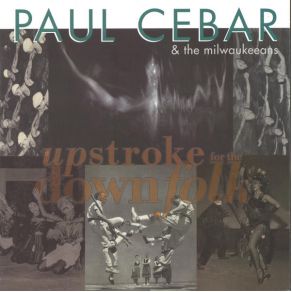Upstroke for the Downfolk
Download links and information about Upstroke for the Downfolk by Paul Cebar. This album was released in 1995 and it belongs to Hip Hop/R&B, Soul, World Music genres. It contains 14 tracks with total duration of 55:20 minutes.

|
|
|---|---|
| Artist: | Paul Cebar |
| Release date: | 1995 |
| Genre: | Hip Hop/R&B, Soul, World Music |
| Tracks: | 14 |
| Duration: | 55:20 |
| Buy it NOW at: | |
| Buy on iTunes $9.99 | |
| Buy on Amazon $8.99 | |
| Buy on Amazon $0.01 | |
| Buy on Songswave €1.56 | |
Tracks
[Edit]| No. | Title | Length |
|---|---|---|
| 1. | Didn't Leave Me No Ladder | 4:21 |
| 2. | Please Don't Tell Me More | 4:15 |
| 3. | I Can't Dance for You | 3:01 |
| 4. | I Ain't Ready | 4:11 |
| 5. | Run Wild, Breathe Easy | 4:03 |
| 6. | Bright Night Train | 4:07 |
| 7. | Hold Me to Your Bones | 3:56 |
| 8. | Blood and Water | 3:53 |
| 9. | Don't Leave Me Listless | 2:52 |
| 10. | Love Don't Have a Clue | 2:53 |
| 11. | A Knife and a Rose | 5:10 |
| 12. | Sliver Moon | 3:54 |
| 13. | The Wild Water | 4:31 |
| 14. | Somewhere We Both Belong | 4:13 |
Details
[Edit]This is the second album from Paul Cebar & the Milwaukeeans. Like their debut That Unhinged Thing and like Cebar's former group the R&B Cadets, Upstroke for the Downfolk fuses many rhythm-oriented styles like R&B, soul, blues, and jazz into an accommodating pop format. His style is very reminiscent of early period Van Morrison in that regard, although he doesn't get bogged down with the lengthy, mystical soundscapes that frequently inhabited Morrison's music. While his voice also shares similarities with Morrison, Cebar is noticeably more upbeat and funky than his Irish counterpart. "Didn't Leave Me No Ladder" is pop-funk number that launches this album but is not necessarily indicative of what's to come. "I Ain't Ready" employs a Motown and '60s soul vocal group style while the very next track, "Run Wild, Breathe Easy," is heavy on Latin percussion and brass. "Bright Night Train" is a boogie number that wouldn't sound out of place in a ZZ Top set and "Blood and Water" continues the rootsy feel in a John Hiatt manner, replete with slide guitar by Rob Gjersoe. Cebar and Gjersoe share the guitar duties throughout this album, handling the varying styles with accomplished ease and respect toward their foundational influences. "Love Don't Have a Clue" possesses a Buddy Holly or Everly Brothers-like charm and appeal and the closing number, "Somewhere We Both Belong," is a tender acoustic ballad featuring Cebar's gruff vocals — which evoke more passion, soul, and believability than most of the processed and generic coffeehouse-types that NPR devotees have elevated to semi-stardom. Widespread fame has eluded guitarist, singer, and songwriter Paul Cebar thus far, but his talents and eclecticism are appreciated by the loyal cult following he has acquired.